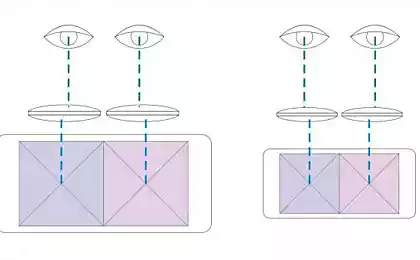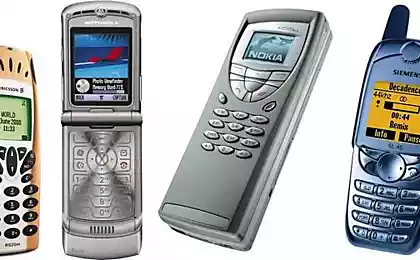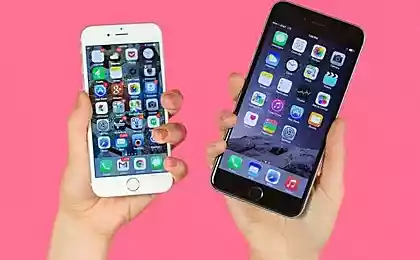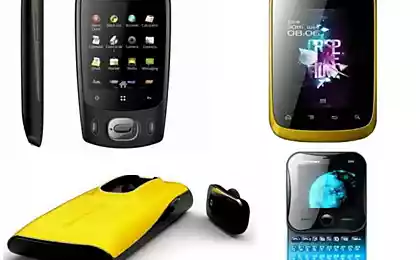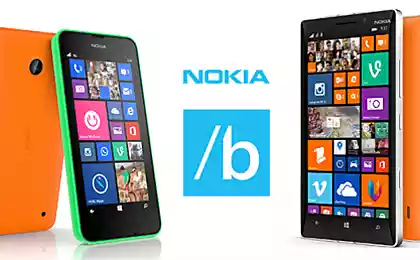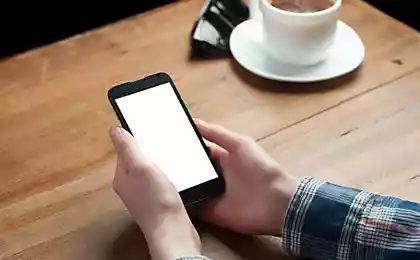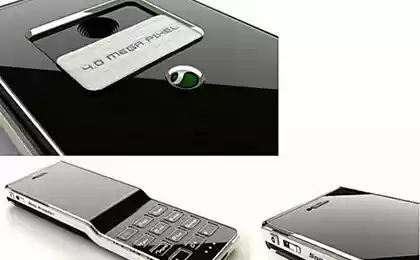742
I don't have a smartphone: why simple mobile phones back in fashion
This spring in several institutions around the world have completed research related to the level of popularity of smartphones and a psychological dependence on them. Scientists from the Institute for media research in Tokyo found out that the users here have started to refuse a "smart device" in favor of ordinary mobile phones and their colleagues from the UK and the USA have come to the conclusion that excessive smartphone use promotes narcissism, neurosis and anxiety disorders. Universities around the world are already developing programmes to encourage and restrictions that allow it to distract students from the phones during lessons.
Points for a lock: how universities and schools are fighting for students ' attention Smartphones sometimes are so dear to us that we are ready to truly defend and impose the need to use them. "I may belong to a sect, but a sect of those who loves quality! — assure the technology enthusiasts iOS. I'm just playing on your smartphone when you go to the toilet. And play in the subway. I do need a camera and WhatsApp. And useful work". And yet these people can't answer the question, are they able to go to the toilet without your smartphone.
The problem of addiction to technology users face today around the world. Specialists of the Institute of information policy of the Ministry of internal Affairs of Japan in 2013 estimated that on average on a weekday the young people here have used a smartphone 116,9 minutes (almost two hours) and on weekends 179,2 minutes (almost three hours — more than one fifth of the total time awake). Today those numbers have grown — now the device can offer the man more pleasing and useful features.
In academia, especially at universities, this raises concerns. In April 2015 the rector of the University of Shinshu (Japan) Kieta of Yamazawa encouraged new students to use less smartphones. "What will you choose: giving up smartphones or waiver of a University? — asked Yamazawa, speaking to two thousand freshmen. Is poison to intelligence, personality and ability to create. You need to disable smart phones and read books, talk to friends and think for themselves. At our University creative students, who themselves reflect on the nature of things and act the best we can".
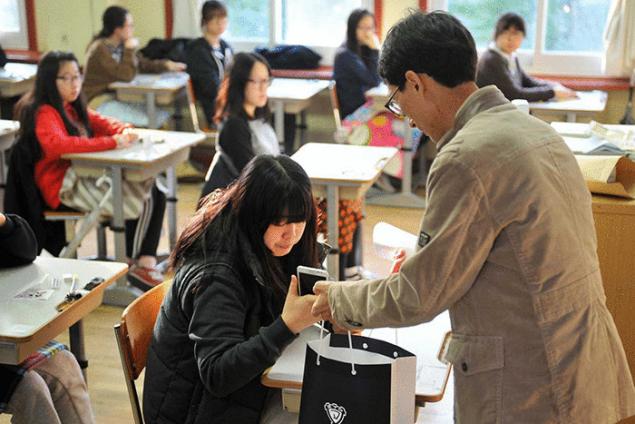
© Jung Yeon-Je—AFP/Getty Images
At the University of Pennsylvania and the University of California (USA) manual is also struggling with excessive use of "smart gadgets". Here students can get discounts at the bookstore and free sweets in the cafeteria, if you turn off the smartphones. Each student can install it on your device the app Pocket Points, which detects when a gadget is on campus, and determines whether it is blocked. One point is charged for every 20 minutes of "downtime"; for 10 points you can get a 15% discount at a local bookstore, and for 15 points — two large biscuits.
Schools Seoul (South Korea) the students are required to be installed on the smartphone app iSmartKeeper that provides teachers with remote access devices, and provides an opportunity to partially block their work in the classroom. The program allows closing access to the service messages, games and social networks, leaving only necessary for practicing functions. Parents may also wish to access the smartphones of their children to those carried out with them not much time.
The Galapagos Islands, but not Islands: a new trend in the mobile market However, not all developed countries have smartphones remain kings of the mobile market. In Japan they recently opposed to classic mobile phones with buttons that are called "Galapagos". Initially the "Galapagos Islands" — the "Galapagos Islands" — in Japan called the local mobile market, due to the fact that it offers many "endemic" products. For example, in 2008 there were sold a phone that can read bar codes, and a phone with a small solar battery.
Smartphones in the Japanese market did not take hold immediately, but an ordinary cell did not fall, even when the new product finally landed on the market. Moreover, according to the multimedia research Institute in Tokyo (Multimedia Research Institute MMRI), in 2014 sales of "Galapagos" began to grow for the first time in seven years. A year in Japan, has sold 10.4 million phones with buttons — 6% more than in 2013. The researchers say that such devices remain popular because are cheaper and possess sufficient features including easy mobile Internet.
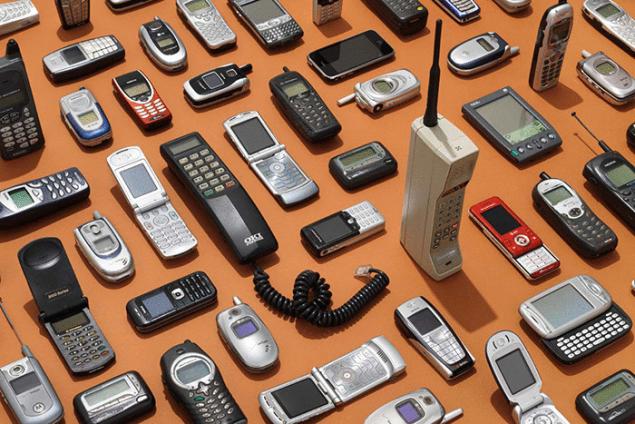
Experts MMRI also found that smartphone users in Japan began to change their ordinary mobile phones, which explains the growth of sales. Players of the mobile market are quite aware of this trend. The largest Japanese mobile operator NTT Docomo and the telecommunications company KDDI Corporation recently announced the release of the new push-button phone based on Android, with a minimal set of features — in fact about 45% of subscribers use Docomo's "Galapagos" and are not going to abandon them.
"There are users who just want to make phone calls and check e-mail, said Docomo President Kaoru Kato. — For us it would be better if they switched to smartphones, but now we hear many voices in defense of the cell. And we'll sell them".
Button fetish: why do the Japanese like simple mobiles 5 March in Barcelona (Spain) ended Mobile World Congress 2015 — the world's largest exhibition of mobile technology. Here you can see not only the smartphones with a larger screen, but new models of push-button phones. For example, KDDI together with Sharp introduced the device on which you can install a minimal set of applications (e.g., applications running and text message service Line), but which looks like a normal folding "mobile phone". "Some buyers are saying that they need a better camera, others that they want to chat with friends through Line, instead of using the message — explains the representative of KDDI. — And then there are weather, news and crosswords, but not like they do for smartphones. We always advise people to buy keypad mobile phones, not smartphones. After all, phones-clamshell is a part of Japanese culture."
How can you refuse smartphone in favor of a simpler device? "They weigh nothing, explain users. — They are small, they are easy to type, easy call". The holders of the ordinary phones can do that was inaccessible to people with smartphones to print to the touch. In addition, push-button telephones often have IR ports (IrDA ports) that allow you to transfer to other phone numbers and other data without the use of the service messages. While a normal mobile phone uses very little data, so cheaper smartphone.
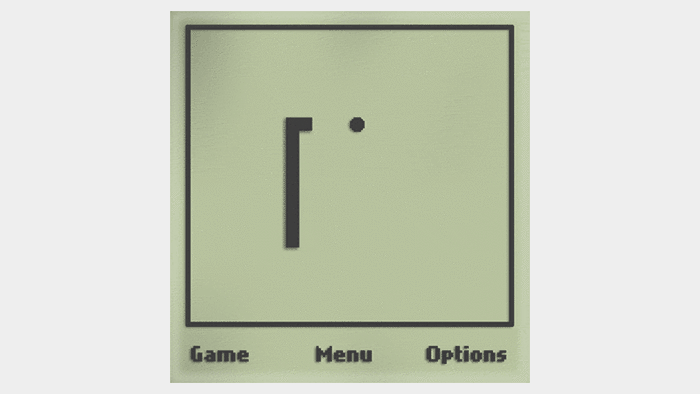
From the point of view of users in Japan the "Galapagos" it has another advantage: unlike a smartphone, they are difficult to break. To charge a phone also need much less. With push-button devices, of course, possible to produce far less action — and yet, the Japanese often choose them instead of smartphones just because of the fact that they are able to work without wires. Some people even refuse new devices in favor of the classical models due to the fact that "don't trust the battery, which cannot and day to stretch without recharging". "I can live without the AppStore, high-speed Internet and touchscreen — says one of the fans of "Galapagos". I just need to make phone calls and send messages."
"I changed my smartphone in cell last year — says another user from Japan. Two years I had a smartphone and I regret buying it a few weeks later. My wife stands waiting for her contract, which requires the use of a smartphone, and was also going to purchase a touchtone phone. We both love the "clamshell". I most appreciate the feeling that you press these buttons, and the ability not to be constantly in touch (there's no Line, thank God!). And the battery can be charged once in two weeks."
A second without a connection: what is the danger of smartphone addiction People are often distracted by smart phones and spend a lot of time with them. We all see that, however different it explain: someone says that he requires the recorder, someone will complain that it was the camera too heavy, and someone, for example, ask — how without a smartphone to count kilometers and heart rate while running? All this, of course, is true: the smartphone can be very useful. And yet, often we use it too heavily, and not always the case.
According to researchers from the University of Derby (UK), 13% of UK smartphone owners spend a 3.6 hours per day — a quarter of waking hours interacting with their device. 35% of users use the services of a smartphone in places where it is prohibited. 87% communicate with it in social networks, 52% use instant messaging. While 46.8% of users have reported that the gadget allowed them to improve social life, and 23.5% argue with them, claiming that the smartphone is becoming a hindrance to "real life".
"Research has shown that excessive smartphone use affects the psychological well-being, says Dr. Zahir Hussain, Professor of psychology at the University of Derby and one of the authors. Today we use smartphones every day for different tasks, so it is important to realize how it affects the psyche. There are many applications for Facebook, Twitter, Instagram, Skype and email. This certainly makes the smartphone much more attractive from a psychological point of view and becomes the basis for addiction. Smartphone addiction is a very interesting phenomenon. Narcissistic personality disorder and neuroses are directly related to her. The more the character of a person with narcissistic traits, the more he depends on his smartphone. Social networks are an excellent soil for the development of this personality disorders and also to increased anxiety and neurosis".

Experts from the University of Derby believe that the manufacturers of "smart" devices are required to warn consumers about the possible harm they can inflict physical and mental health — as well as producers of alcohol and cigarettes.
"People need to know that new technologies are addictive, before you buy it or download the app, explains Dr. Hussein. — If you download the game — for example, Candy Crush or Flappy Bird — it should accompany a warning that in the end you can play it for hours on end, ignoring real-life obligations."
Scientists from the University of Iowa (USA) in 2015 has also explored the phenomenon of nomophobia ("no-mobile-phone" phobia). They interviewed more than 300 students who use smartphones, and found that most of them truly terrifying prospect to remain without communication. Respondents argued that "I feel uncomfortable without constant access to information", are "nervous without access to the news, get annoyed if I can't get the smartphone in hand", "scared if the battery is low, all the time I want to check the accounts", "I feel helpless without a smartphone", are nervous, feel anxiety, embarrassment and even panic.
Excessive smartphone usage can also lead to poor sleep, especially when falling asleep. The screens of devices such as computer screens, emit blue spectrum light, which reduces the amount of melatonin — the "sleep hormone" that is produced in the brain, if the person is in the dark. The light blue spectrum allows to correct the process is so effective that it is even used to treat seasonal affective disorder or "winter depression". Blue bulbs help people with this disease to Wake up, do not allow them to sleep in the evenings and during the day — for example, during the polar night.
A sense of independence: the experience of living without a smartphone
It is reasonable, of course, to ask journalists and researchers that describe the impact of smartphones on brain and mind: "which device do you use?". Dr Zair Hussain, for example, he is now the owner of a smartphone, but uses it only at Breakfast and in the evenings and during the day, in transport, in the early morning and before going to bed not touching him. It may seem that doing public work is not possible without "smart gadget" — but if it really were so, such a profession would have appeared only with the emergence of the Internet, and not long before him.
Life without a smartphone (as in life with a smartphone) has many specific advantages. Leaving your office or from home, you are alone, and no one can contact you via e-mail, social networks or using apps for instant message delivery. Of course, in a big city it is difficult to live without mobile phones, but it is quite capable of providing an ordinary cell, through calls and SMS. The latter, of course, not so convenient and not so immediate — so if necessary a non-stop mikeallen really?
Mobile without connection or with a minimum Internet connection that protects personal space, while the smartphone to a certain extent exposes it to erosion due to the constant virtual presence of other people and products of their activity: news, posts, tweets. This, of course, does not mean that we should not read the news or blogs, but because they can read the computer and not be "always aware".

Life without a smartphone also allows you to significantly to relieve the brain because you do not have to continuously switch from task to task and process a lot of content, which is not even stored among the memories, as it is of no value. Reward mechanisms that actively involve the gaming applications don't work "idle", when the destruction of images of balls or cubes on the screen you feel a series of short (and pointless) flashes satisfaction through successful execution of the task. This supports the need to "reward" other ways in real life.
And, in the end, the end, in the real world we have all the tools we need to include alarms for every taste and color, a great modern voice recorders, light and powerful camera, compact notepads, books-paperback and ebooks with a screen similar to the paper page, and so on and so forth. Looking at the range, we have to admit that we love their smartphones not only because they replace the alarm clock or the voice recorder, but also because they tie us to himself through less obvious mechanisms. They are pleasant to the touch, beautiful, fragile, they easily adapt to our habits, and they are always new, and "very our" — filled with personal photos, records, dialogues and addresses.
They are, because the "offer creates demand" and "demand creates supply". It is not all about technology, and not really about the development of society. Many very attentive people listening to everything we say about ourselves and about relationships. After all, they need to make a purchase, it is necessary that we share information. They will do everything in order to maintain our interest, because interest is profit. Are we so hard to change a way of life for someone else's profit? This, of course, is another question.published
P. S. And remember, only by changing their consumption — together we change the world! ©
Source: theoryandpractice.ru
Points for a lock: how universities and schools are fighting for students ' attention Smartphones sometimes are so dear to us that we are ready to truly defend and impose the need to use them. "I may belong to a sect, but a sect of those who loves quality! — assure the technology enthusiasts iOS. I'm just playing on your smartphone when you go to the toilet. And play in the subway. I do need a camera and WhatsApp. And useful work". And yet these people can't answer the question, are they able to go to the toilet without your smartphone.
The problem of addiction to technology users face today around the world. Specialists of the Institute of information policy of the Ministry of internal Affairs of Japan in 2013 estimated that on average on a weekday the young people here have used a smartphone 116,9 minutes (almost two hours) and on weekends 179,2 minutes (almost three hours — more than one fifth of the total time awake). Today those numbers have grown — now the device can offer the man more pleasing and useful features.
In academia, especially at universities, this raises concerns. In April 2015 the rector of the University of Shinshu (Japan) Kieta of Yamazawa encouraged new students to use less smartphones. "What will you choose: giving up smartphones or waiver of a University? — asked Yamazawa, speaking to two thousand freshmen. Is poison to intelligence, personality and ability to create. You need to disable smart phones and read books, talk to friends and think for themselves. At our University creative students, who themselves reflect on the nature of things and act the best we can".

© Jung Yeon-Je—AFP/Getty Images
At the University of Pennsylvania and the University of California (USA) manual is also struggling with excessive use of "smart gadgets". Here students can get discounts at the bookstore and free sweets in the cafeteria, if you turn off the smartphones. Each student can install it on your device the app Pocket Points, which detects when a gadget is on campus, and determines whether it is blocked. One point is charged for every 20 minutes of "downtime"; for 10 points you can get a 15% discount at a local bookstore, and for 15 points — two large biscuits.
Schools Seoul (South Korea) the students are required to be installed on the smartphone app iSmartKeeper that provides teachers with remote access devices, and provides an opportunity to partially block their work in the classroom. The program allows closing access to the service messages, games and social networks, leaving only necessary for practicing functions. Parents may also wish to access the smartphones of their children to those carried out with them not much time.
The Galapagos Islands, but not Islands: a new trend in the mobile market However, not all developed countries have smartphones remain kings of the mobile market. In Japan they recently opposed to classic mobile phones with buttons that are called "Galapagos". Initially the "Galapagos Islands" — the "Galapagos Islands" — in Japan called the local mobile market, due to the fact that it offers many "endemic" products. For example, in 2008 there were sold a phone that can read bar codes, and a phone with a small solar battery.
Smartphones in the Japanese market did not take hold immediately, but an ordinary cell did not fall, even when the new product finally landed on the market. Moreover, according to the multimedia research Institute in Tokyo (Multimedia Research Institute MMRI), in 2014 sales of "Galapagos" began to grow for the first time in seven years. A year in Japan, has sold 10.4 million phones with buttons — 6% more than in 2013. The researchers say that such devices remain popular because are cheaper and possess sufficient features including easy mobile Internet.

Experts MMRI also found that smartphone users in Japan began to change their ordinary mobile phones, which explains the growth of sales. Players of the mobile market are quite aware of this trend. The largest Japanese mobile operator NTT Docomo and the telecommunications company KDDI Corporation recently announced the release of the new push-button phone based on Android, with a minimal set of features — in fact about 45% of subscribers use Docomo's "Galapagos" and are not going to abandon them.
"There are users who just want to make phone calls and check e-mail, said Docomo President Kaoru Kato. — For us it would be better if they switched to smartphones, but now we hear many voices in defense of the cell. And we'll sell them".
Button fetish: why do the Japanese like simple mobiles 5 March in Barcelona (Spain) ended Mobile World Congress 2015 — the world's largest exhibition of mobile technology. Here you can see not only the smartphones with a larger screen, but new models of push-button phones. For example, KDDI together with Sharp introduced the device on which you can install a minimal set of applications (e.g., applications running and text message service Line), but which looks like a normal folding "mobile phone". "Some buyers are saying that they need a better camera, others that they want to chat with friends through Line, instead of using the message — explains the representative of KDDI. — And then there are weather, news and crosswords, but not like they do for smartphones. We always advise people to buy keypad mobile phones, not smartphones. After all, phones-clamshell is a part of Japanese culture."
How can you refuse smartphone in favor of a simpler device? "They weigh nothing, explain users. — They are small, they are easy to type, easy call". The holders of the ordinary phones can do that was inaccessible to people with smartphones to print to the touch. In addition, push-button telephones often have IR ports (IrDA ports) that allow you to transfer to other phone numbers and other data without the use of the service messages. While a normal mobile phone uses very little data, so cheaper smartphone.

From the point of view of users in Japan the "Galapagos" it has another advantage: unlike a smartphone, they are difficult to break. To charge a phone also need much less. With push-button devices, of course, possible to produce far less action — and yet, the Japanese often choose them instead of smartphones just because of the fact that they are able to work without wires. Some people even refuse new devices in favor of the classical models due to the fact that "don't trust the battery, which cannot and day to stretch without recharging". "I can live without the AppStore, high-speed Internet and touchscreen — says one of the fans of "Galapagos". I just need to make phone calls and send messages."
"I changed my smartphone in cell last year — says another user from Japan. Two years I had a smartphone and I regret buying it a few weeks later. My wife stands waiting for her contract, which requires the use of a smartphone, and was also going to purchase a touchtone phone. We both love the "clamshell". I most appreciate the feeling that you press these buttons, and the ability not to be constantly in touch (there's no Line, thank God!). And the battery can be charged once in two weeks."
A second without a connection: what is the danger of smartphone addiction People are often distracted by smart phones and spend a lot of time with them. We all see that, however different it explain: someone says that he requires the recorder, someone will complain that it was the camera too heavy, and someone, for example, ask — how without a smartphone to count kilometers and heart rate while running? All this, of course, is true: the smartphone can be very useful. And yet, often we use it too heavily, and not always the case.
According to researchers from the University of Derby (UK), 13% of UK smartphone owners spend a 3.6 hours per day — a quarter of waking hours interacting with their device. 35% of users use the services of a smartphone in places where it is prohibited. 87% communicate with it in social networks, 52% use instant messaging. While 46.8% of users have reported that the gadget allowed them to improve social life, and 23.5% argue with them, claiming that the smartphone is becoming a hindrance to "real life".
"Research has shown that excessive smartphone use affects the psychological well-being, says Dr. Zahir Hussain, Professor of psychology at the University of Derby and one of the authors. Today we use smartphones every day for different tasks, so it is important to realize how it affects the psyche. There are many applications for Facebook, Twitter, Instagram, Skype and email. This certainly makes the smartphone much more attractive from a psychological point of view and becomes the basis for addiction. Smartphone addiction is a very interesting phenomenon. Narcissistic personality disorder and neuroses are directly related to her. The more the character of a person with narcissistic traits, the more he depends on his smartphone. Social networks are an excellent soil for the development of this personality disorders and also to increased anxiety and neurosis".

Experts from the University of Derby believe that the manufacturers of "smart" devices are required to warn consumers about the possible harm they can inflict physical and mental health — as well as producers of alcohol and cigarettes.
"People need to know that new technologies are addictive, before you buy it or download the app, explains Dr. Hussein. — If you download the game — for example, Candy Crush or Flappy Bird — it should accompany a warning that in the end you can play it for hours on end, ignoring real-life obligations."
Scientists from the University of Iowa (USA) in 2015 has also explored the phenomenon of nomophobia ("no-mobile-phone" phobia). They interviewed more than 300 students who use smartphones, and found that most of them truly terrifying prospect to remain without communication. Respondents argued that "I feel uncomfortable without constant access to information", are "nervous without access to the news, get annoyed if I can't get the smartphone in hand", "scared if the battery is low, all the time I want to check the accounts", "I feel helpless without a smartphone", are nervous, feel anxiety, embarrassment and even panic.
Excessive smartphone usage can also lead to poor sleep, especially when falling asleep. The screens of devices such as computer screens, emit blue spectrum light, which reduces the amount of melatonin — the "sleep hormone" that is produced in the brain, if the person is in the dark. The light blue spectrum allows to correct the process is so effective that it is even used to treat seasonal affective disorder or "winter depression". Blue bulbs help people with this disease to Wake up, do not allow them to sleep in the evenings and during the day — for example, during the polar night.
A sense of independence: the experience of living without a smartphone
It is reasonable, of course, to ask journalists and researchers that describe the impact of smartphones on brain and mind: "which device do you use?". Dr Zair Hussain, for example, he is now the owner of a smartphone, but uses it only at Breakfast and in the evenings and during the day, in transport, in the early morning and before going to bed not touching him. It may seem that doing public work is not possible without "smart gadget" — but if it really were so, such a profession would have appeared only with the emergence of the Internet, and not long before him.
Life without a smartphone (as in life with a smartphone) has many specific advantages. Leaving your office or from home, you are alone, and no one can contact you via e-mail, social networks or using apps for instant message delivery. Of course, in a big city it is difficult to live without mobile phones, but it is quite capable of providing an ordinary cell, through calls and SMS. The latter, of course, not so convenient and not so immediate — so if necessary a non-stop mikeallen really?
Mobile without connection or with a minimum Internet connection that protects personal space, while the smartphone to a certain extent exposes it to erosion due to the constant virtual presence of other people and products of their activity: news, posts, tweets. This, of course, does not mean that we should not read the news or blogs, but because they can read the computer and not be "always aware".

Life without a smartphone also allows you to significantly to relieve the brain because you do not have to continuously switch from task to task and process a lot of content, which is not even stored among the memories, as it is of no value. Reward mechanisms that actively involve the gaming applications don't work "idle", when the destruction of images of balls or cubes on the screen you feel a series of short (and pointless) flashes satisfaction through successful execution of the task. This supports the need to "reward" other ways in real life.
And, in the end, the end, in the real world we have all the tools we need to include alarms for every taste and color, a great modern voice recorders, light and powerful camera, compact notepads, books-paperback and ebooks with a screen similar to the paper page, and so on and so forth. Looking at the range, we have to admit that we love their smartphones not only because they replace the alarm clock or the voice recorder, but also because they tie us to himself through less obvious mechanisms. They are pleasant to the touch, beautiful, fragile, they easily adapt to our habits, and they are always new, and "very our" — filled with personal photos, records, dialogues and addresses.
They are, because the "offer creates demand" and "demand creates supply". It is not all about technology, and not really about the development of society. Many very attentive people listening to everything we say about ourselves and about relationships. After all, they need to make a purchase, it is necessary that we share information. They will do everything in order to maintain our interest, because interest is profit. Are we so hard to change a way of life for someone else's profit? This, of course, is another question.published
P. S. And remember, only by changing their consumption — together we change the world! ©
Source: theoryandpractice.ru
Painting a wooden house. How to protect your fortress
Why we know nothing about fruit that cures cancer?
